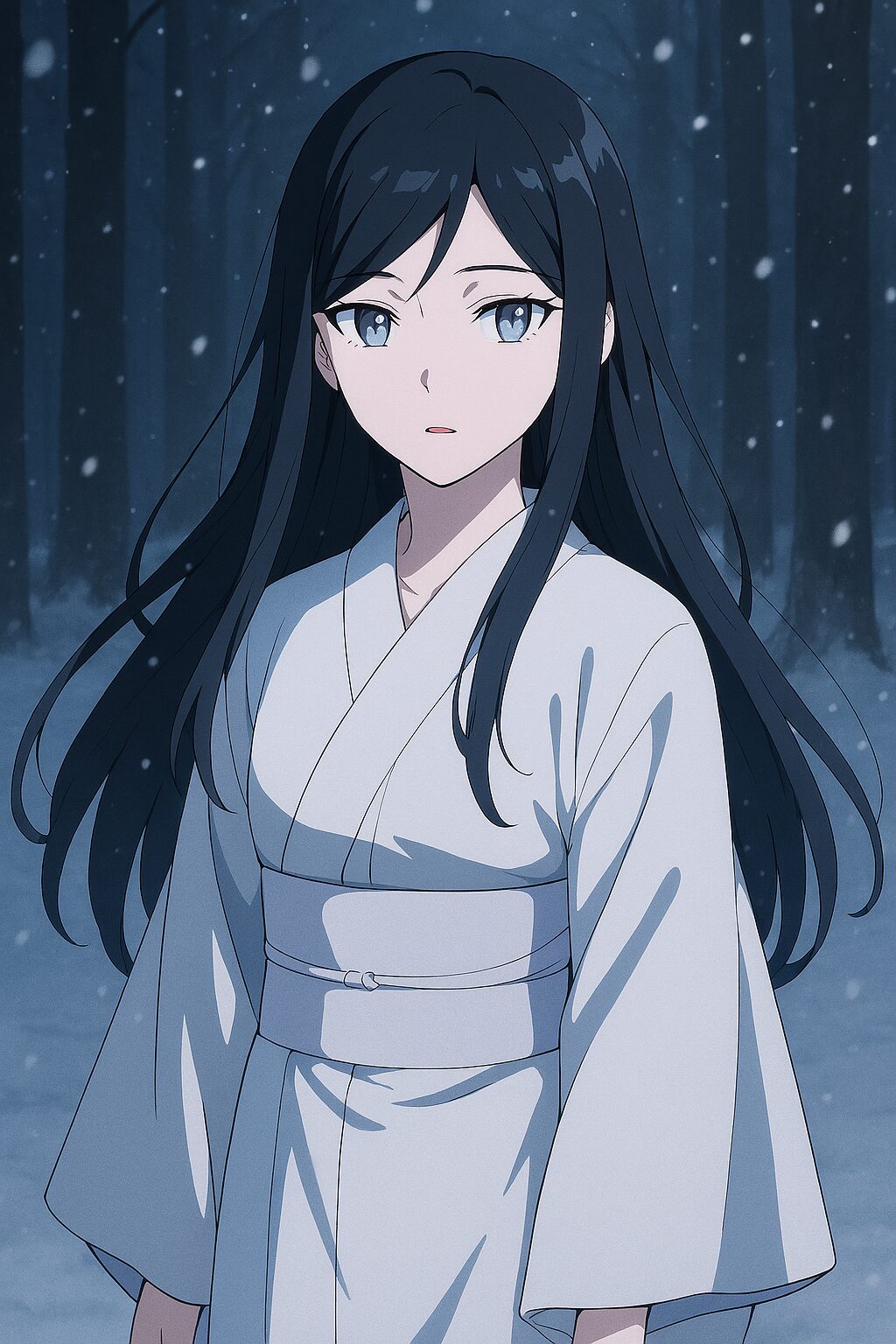- Introduction: Who Is Yuki-onna?
- The Classic Tale: Retold by Lafcadio Hearn
- Cultural Symbolism: Nature and Boundaries
- Modern Interpretations: Anime, Film, and Literature
- Why Global Readers Are Drawn to Yuki-onna
- Further Reading & Resources
- Conclusion: The Snow Woman Within Us
- はじめに:雪女とは何者か?
- 雪女の代表的な物語:小泉八雲による再話
- 雪女の文化的背景:自然と人間の境界
- 雪女と現代:アニメ・映画・文学への影響
- 海外の読者に向けて:雪女はなぜ魅力的なのか?
- 関連リンク・参考資料
- 終わりに:雪女は私たちの心の中にいる
Introduction: Who Is Yuki-onna?
Yuki-onna, or the “snow woman,” is a mysterious figure from traditional Japanese ghost stories and folktales. She appears on snowy nights, dressed in white, with skin as pale as freshly fallen snow. It’s said she can freeze a person with a single breath. Her beauty is ethereal, but her presence is chilling.
More than just a ghost story, Yuki-onna reflects Japan’s deep connection to nature, mortality, and the emotional tension between love and duty.
The Classic Tale: Retold by Lafcadio Hearn
One of the most famous versions of Yuki-onna’s story was retold by Lafcadio Hearn, a Greek-born writer who became a naturalized Japanese citizen. His version, published in the collection Kwaidan, goes like this:
On a snowy night, a woodcutter and his son take shelter in a mountain hut. A beautiful woman appears—Yuki-onna—and kills the father with her icy breath. She spares the son, Minokichi, because of his youth, but warns him never to speak of what he saw. Years later, Minokichi marries a beautiful woman and has children. One night, he tells her the story of Yuki-onna. She reveals herself to be the snow spirit and says, “You broke your promise. I should kill you, but for the sake of our children, I will let you live.” Then she vanishes.
You can read the full story in English via Aozora Bunko.
Cultural Symbolism: Nature and Boundaries
- Winter’s Harshness: Yuki-onna represents the deadly force of winter. In snowbound villages, death by cold was a real threat.
- Beauty and Fear: Her elegance hides danger. This duality reflects a Japanese aesthetic where beauty and peril coexist.
- Taboo and Promise: The story hinges on a broken vow. In Japanese culture, words carry spiritual weight—breaking a promise invites misfortune.
Modern Interpretations: Anime, Film, and Literature
Yuki-onna continues to inspire contemporary media:
- The 2017 film Yuki-onna, directed and starring Kiki Sugino, reimagines the tale with poetic visuals and emotional depth. View the film details here.
- She appears in anime like Hell Girl and Yo-kai Watch, making her accessible to younger audiences.
- In literature, Yuki-onna’s archetype echoes in works like Yasunari Kawabata’s Snow Country, where fragile beauty and emotional distance intertwine.
Why Global Readers Are Drawn to Yuki-onna
- Mystical Appeal: Unlike Western ghosts or vampires, Yuki-onna is a spirit born of nature itself.
- Universal Themes: Her story explores love, secrecy, forgiveness, and the consequences of broken trust.
- Visual Elegance: A woman in white, standing in a silent snowfall—her image is hauntingly cinematic.
Further Reading & Resources
- Yuki-onna by Lafcadio Hearn (Aozora Bunko)
- Yuki-onna (2017) Film Review
- Japanese Folktale Series by Yuta Matsuura
Conclusion: The Snow Woman Within Us
Yuki-onna’s tale has endured for generations because she embodies something deeply human. She is not just a ghost, but a mirror to our inner fears, longings, and moral dilemmas.
On a quiet winter night, as snow falls gently outside, you might feel her presence—not as a threat, but as a reflection of something hidden within yourself.
❄️雪女:日本の冬に潜む美しき怪異の物語
はじめに:雪女とは何者か?
雪女(ゆきおんな)は、日本の伝統的な怪談や民話に登場する、雪の夜に現れる美しい女性の妖怪です。白い着物をまとい、肌は雪のように白く、息を吹きかけるだけで人を凍らせるといわれています。その姿は幻想的でありながら、どこか恐ろしさを秘めています。
この物語は、単なる怪談ではなく、日本人の自然観、死生観、そして人間の情と理の葛藤を映し出す鏡でもあります。
雪女の代表的な物語:小泉八雲による再話
雪女の物語を世界に広めた人物のひとりが、ギリシャ生まれで日本に帰化した作家・小泉八雲(ラフカディオ・ハーン)です。彼の『怪談』に収録された「雪女」は、以下のような筋書きです。
吹雪の夜、木こりの親子が山小屋で雪女に遭遇する。父親は命を奪われるが、息子・民谷は若さゆえに命を助けられる。雪女は「このことを誰にも話してはならない」と言い残して去る。数年後、民谷は美しい女性と結婚し、子どもをもうける。ある夜、彼は雪女の話を妻に語ってしまう。すると妻は正体を現し、「約束を破ったから殺すべきだが、子どもたちのために命は取らない」と言って姿を消す。
この物語は、青空文庫で全文を読むことができます。
雪女の文化的背景:自然と人間の境界
- 冬の厳しさ:雪女は冬の死の象徴。雪に閉ざされた村では、命を落とすことも珍しくありませんでした。
- 美と恐怖の共存:雪女は美しいが恐ろしい。これは「美しいものほど危険」という日本的な美意識の表れです。
- 約束と禁忌:物語の中で「話してはならない」という約束が破られることで悲劇が起きます。これは日本文化における「言霊」や「口にすることの重み」を示しています。
雪女と現代:アニメ・映画・文学への影響
雪女は現代でも多くの作品に登場します。
- 映画『雪女』(2017年公開)は、小泉八雲の物語を現代的に再解釈した作品です。監督・主演は杉野希妃さんが務め、幻想的かつ文芸的な演出が話題となりました。映画の詳細はこちら
- アニメ『地獄少女』や『妖怪ウォッチ』などにも雪女が登場し、子どもたちにも親しまれています。
- 文学では、川端康成の短編『雪国』にも雪女的な女性像が登場します。
海外の読者に向けて:雪女はなぜ魅力的なのか?
- 神秘的な存在:西洋の吸血鬼や幽霊とは異なる、自然と融合した妖怪。
- 道徳的な物語:約束を守ること、家族への愛、そして許しのテーマが普遍的。
- 視覚的な美しさ:白い着物、雪景色、静寂の中の女性というビジュアルは、アニメや映画でも映える。
関連リンク・参考資料
終わりに:雪女は私たちの心の中にいる
雪女の物語は、時代を超えて語り継がれています。それは、彼女が単なる妖怪ではなく、人間の心の奥にある「孤独」「愛」「恐れ」「赦し」といった感情を映し出す存在だからです。
冬の夜、静かに雪が降るとき、あなたのそばにも雪女が立っているかもしれません——その姿は、あなた自身の心の中にある何かを映しているのかもしれません。



コメント